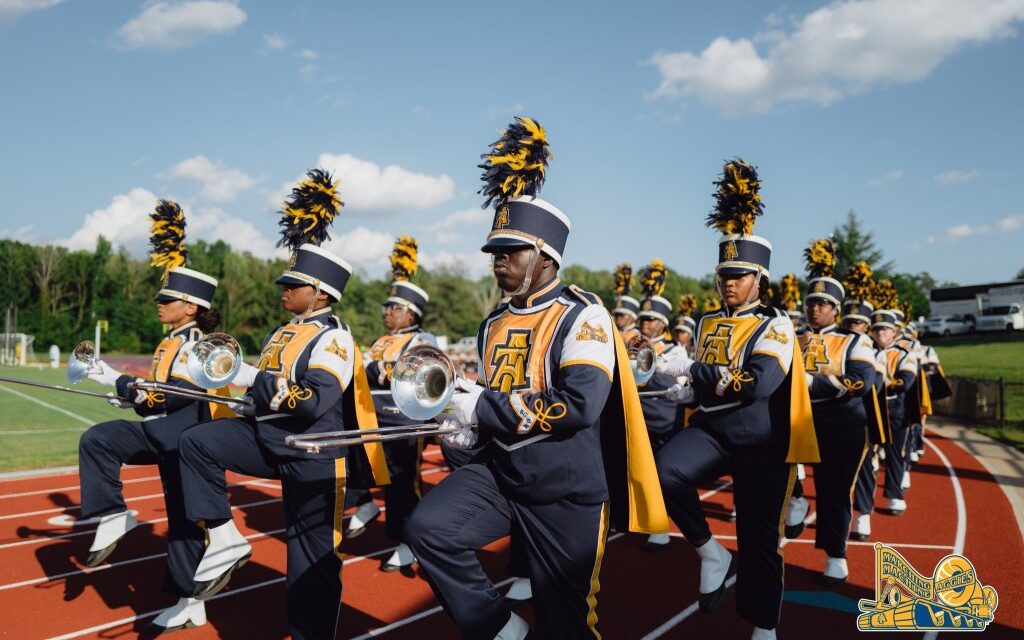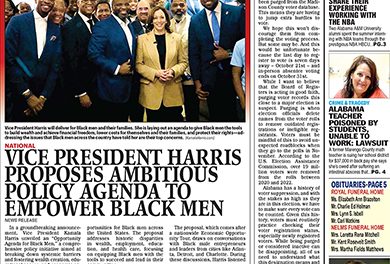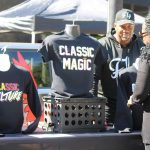By Aria Brent
AFRO Staff Writer
abrent@afro.com
A prime component of Black culture is music. It defines eras, tells stories and creates soundtracks for our lives. It is only right, then, that historically Black colleges and universities have a playlist of their own, driven by the sounds of the campus marching band.
Maryland Public Television highlighted the important role that marching bands bring to HBCU culture and the on-campus experience. “Sounds of the Game” recognized the amazing career of Melvin Miles, former director of Morgan State’s band, The Magnificent Marching Machine, and the impact he has made to HBCU bands. Much like Miles, HBCU marching bands have legacies that are known well beyond their respective campuses.
“You can’t bring up Black culture at all without music because it’s such a cornerstone in our ancestry,” said Emery Alexander, a member of the Blue and Gold Marching Machine at North Carolina Agricultural and Technical State University. “People have been able to see that from the moment we arrived in this country and even before we got here. I think it’s (marching band) just a more modern expression of that cornerstone.”
Alexander has been in marching band since eighth grade and credits the extracurricular activity with helping him develop relationships and grow as a person. Through his tenure in the university band he has been able to learn leadership skills and serve the band and his college campus as a member of the Iota Zeta chapter of Kappa Kappa Psi National Honorary Band Fraternity.
The young musician noted that his high school band director exposed him to HBCU band culture and piqued his interest in attending one of the historical institutes. Alexander explained what it is that makes HBCU bands so special and sets them apart from bands at other colleges and universities.
“He really put me on to the HBCU band side of things. Show style and corps style are two completely different realms–it’s the same universe but it’s two different planets across the solar system,” Alexander said. “With show style, the most obvious difference is the marching. Your knee has to be at a 90-degree angle and your toes are pointed, meanwhile with corps style everything is very low to the ground. You have to make it look like you’re floating.”
Most HBCUs take after the show style genre of bands, which has helped mold the world-renowned experience they’re known for creating. This includes their choice of music, choreography that is incorporated into the performance and other performers such as dancers and color guards. Schools like Florida Agricultural and Mechanical University, Alcorn State University and Alabama State University are infamous for their performances including these theatrical components.
“HBCU bands bring out the best of what marching band has to offer,” said Kaylyn Stampley, a member of The Sonic Boom of The South at Jackson State University. “Most of the time when you find HBCU bands they are show style versus corps style. Show style is what we do here at Jackson State University. It’s the wow factor, the things that catch your eye, the things that you would never imagine any band doing. We take a different sense of pride in the way that we do our bands at HBCUs.”
Jackson State is known for their band performances that fulfill “The Thrill of a Billion Eyes.” Stampley shared with the AFRO that she grew up in an environment that was heavily influenced by HBCU culture, so when she decided to go to college she chose to attend somewhere with a sense of familiarity.
“HBCU bands bring out the best of what marching band has to offer…. We take a different sense of pride in the way that we do our bands at HBCUs.”
“Being from Mississippi, our culture in the South lets us get the feel for an HBCU throughout high school. I’m not going to say it’s all I knew, but it’s all I wanted to know,” said Stampley. “I chose an HBCU to speak to what I knew culture wise and because of what they had to offer as opposed to a predominantly White institute.”
Like all great things, HBCU marching bands take their time. Both Alexander and Stampley discussed how much time and dedication it takes to get the final product seen at games, events and parades.
“In my experience at HBCUs our practice times have always been what other people in other bands would consider outrageous,” said Alexander. “At NCAT, we start practice at 5 p.m. and don’t get out until about 9 or 10 p.m.”
Stampley furthered Alexander’s point by explaining just how much preparation the bands go through to give a good show.
“We have all these things to remember and we’re constantly practicing to make sure that everything is perfect before we go out and showcase it,” said Stampley. “I’m not saying that PWI bands don’t practice but I know from being in an HBCU band the amount of effort and work and bloodshed and tears that’s given to our band programs.”
The effort put into many HBCU band programs certainly isn’t in vain. Schools such as Morgan State and Howard University have had the opportunity to play for President Barack Obama and Vice President Kamala Harris. Meanwhile other bands like Tennessee State University’s Aristocrat of Bands won a Grammy earlier this year for their gospel album “The Urban Hymnal.” All HBCU bands have been able to provide a great deal of exposure to their schools and even the conferences they fall into.
“The role that marching bands bring to HBCUs is exposure. Most people haven’t experienced or seen a HBCU band in person, they’ve mostly just seen it on social media,” said Samario Williams. “A lot of people who don’t know about the school itself usually recognize or know of the school’s band when it comes to HBCUs.”
Southern University and Agricultural and Mechanical College (Southern) is home of the Human Jukebox, where Williams played the sousaphone.
Whether they are opening the eyes of strangers and exposing them to all that their band programs have to offer or providing the soundtrack for an entire community of students, staff and alumni, HBCU bands are not only heard but also felt wherever they go. They really are defining what it means to “ Do it for The Culture.”
The post Listen to the Yard: How marching bands shape HBCU culture appeared first on AFRO American Newspapers .










